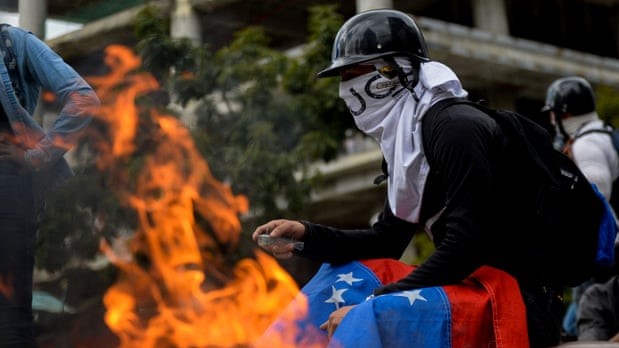
Inquiry opened into claims of torture and extrajudicial killings under Maduro’s rule, a first for a Latin American country.
By The Guardian
Nov 4, 2021
The international criminal court (ICC) is opening a formal investigation into allegations of torture and extrajudicial killings committed by Venezuelan security forces under President Nicolás Maduro’s rule, the first time a country in Latin América is facing scrutiny for possible crimes against humanity from the court.
The opening of the probe was announced Wednesday by ICC chief prosecutor Karim Khan at the end of a three-day trip to Caracas.
Standing alongside Maduro, Khan said he was aware of the political “fault lines” and “geopolitical divisions” that exist in Venezuela. But he said his job was to uphold the principles of legality and the rule of law, not settle scores.
“I ask everybody now, as we move forward to this new stage, to give my office the space to do its work,” he said. “I will take a dim view of any efforts to politicise the independent work of my office.”
While Khan didn’t outline the scope of the ICC’s investigation, it follows a lengthy preliminary probe started in February 2018 ‘ later backed by Canada and five Latin American governments opposed to Maduro ‘ that focused on allegations of excessive force, arbitrary detention and torture by security forces during a crackdown on antigovernment protests in 2017.
Human rights groups and the US-backed opposition immediately celebrated the decision. Since its creation two decades ago, the ICC has mostly focused on atrocities committed in Africa.
“Not only does it provide hope to the many victims of Maduro’s government but it also is a reality check that Maduro himself could be held accountable for crimes committed by his security forces and others with total impunity in the name of the Bolivarian revolution.”
It could be years before any criminal charges are presented as part of the ICC’s investigation.
Maduro said he disagreed with Khan’s criteria in choosing to open the probe. But he expressed optimism that a three-page “letter of understanding” he signed with the prosecutor that would allow Venezuelan authorities to carry out their own proceedings in search of justice, something allowed under the Rome statute that created the ICC.
“I guarantee that in this new phase we will leave the noise to the side and get down to work so that, together, the truth can be found,” said Maduro.
Maduro’s government last year also asked the ICC to investigate the US ‘ which is not among the ICC’s 123 member states ‘ for its policy of economic sanctions focused on removing Maduro. Venezuela considers the US sanctions tantamount to “unlawful coercive measures” that have spelled poverty for millions of Venezuelans.
Khan’s predecessor, Fatou Bensouda, had indicated there was a reasonable basis to conclude that crimes against humanity had been committed in Venezuela, echoing the findings of the UN’s own human rights council last year. But she left the decision to open any probe to her successor Khan, a British lawyer who took the reins of the ICC earlier this year.
We have no shareholders and no billionaire owner. Just the determination and passion to deliver high-impact reporting for the world, always free from commercial and political influence. Reporting like this is vital for democracy, for fairness and to demand better from the powerful. And we provide all this for free, for everyone, regardless of their ability to pay for it.
As such, tens of millions have placed their trust in us for the last 200 years, turning to us in moments of crisis, uncertainty, solidarity and hope. With more than 1.5 million supporters in 180 countries, our model for open access journalism is better sustained, meaning we can reach more people. This helps everyone keep track of global events like the climate summit, understand their impact on people and communities, and become inspired to take meaningful action.
…
Read More: The Guardian – Venezuela faces landmark ICC investigation over alleged crimes against humanity
…

